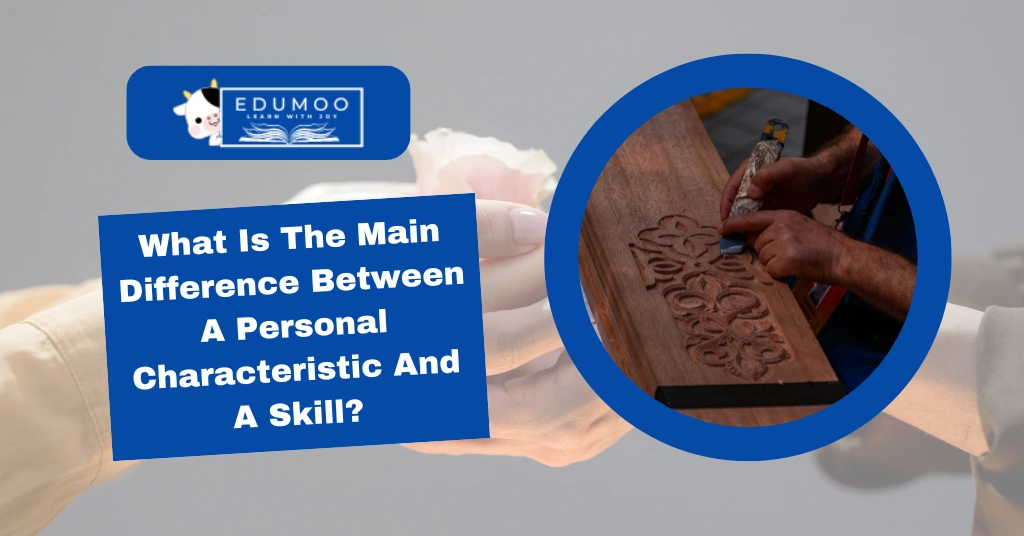In daily life, we often hear the terms “personal characteristics” and “skills.” People use them to describe abilities and traits. However, they mean different things. In this blog, we will explore what is the main difference between a personal characteristic and a skill. This blog is written with clear language so that college students can understand easily.
| Also Read: How Do You Plan To Finance Your Education: A Guide |
What Are Personal Characteristics?
Personal characteristics refer to the traits or qualities that define a person’s behavior, attitude, or temperament. They are part of who a person is. These traits are usually natural or developed over time through experience, but they are not typically taught in a formal setting.
Key Points About Personal Characteristics
- Inborn or Developed – These traits can be part of your nature or shaped by life experiences.
- Influence Behavior – Personal characteristics influence how we act in different situations.
- Difficult to Measure – You can observe personal characteristics, but they are not easy to measure with numbers.
- Long-lasting – They tend to stay with a person for most of their life.
Examples of Personal Characteristics
- Honesty – Being truthful in words and actions.
- Patience – Staying calm in challenging situations.
- Confidence – Believing in your own abilities.
- Empathy – Understanding and sharing the feelings of others.
What Are Skills?
Skills refer to the abilities that a person learns through practice, training, or education. Unlike personal characteristics, skills can be taught and improved over time. They are specific tasks or actions a person can perform well.
Key Points About Skills
- Learned Through Training – Skills can be acquired by practicing, studying, or training.
- Can Be Measured – Skills are easier to measure and test than personal characteristics.
- Task-Specific – A skill allows a person to perform a specific task effectively.
- Can Be Improved – People can build their skills with time and practice.
Examples of Skills
- Public Speaking – The ability to speak clearly and confidently to a group.
- Programming – Writing computer code to create software or apps.
- Time Management – Planning and organizing your time effectively.
- Cooking – Preparing meals by following recipes and using proper techniques.
What Is The Main Difference Between A Personal Characteristic And A Skill?
Now that we understand what personal characteristics and skills are, let’s discuss the main difference between them.
The Core Difference
- Personal characteristics are more about who you are as a person, while skills are about what you can do based on training or experience.
To explain further:
- Personal characteristics are part of a person’s nature and affect their behavior, while skills are abilities that are learned and applied to complete tasks.
Comparison Table
| Personal Characteristics | Skills |
| Describe who you are | Describe what you can do |
| Inborn or developed over time | Learned through practice or education |
| Hard to measure | Easy to measure or test |
| Long-lasting | Can be improved with practice |
How Personal Characteristics and Skills Work Together
Though they are different, personal characteristics and skills often complement each other. For example, a person with strong communication skills might also have the personal characteristic of patience, making them an effective teacher or counselor.
Example
Consider a nurse. The nurse has technical skills, such as:
- Administering medication
- Taking care of patients
However, to be truly successful, the nurse also needs personal characteristics, such as:
- Empathy to connect with patients
- Patience to deal with stressful situations
In this case, both skills and personal characteristics work together to make the nurse excel in their job.
How to Improve Personal Characteristics and Skills
Improving both personal characteristics and skills can enhance your personal and professional life.
Tips to Improve Personal Characteristics
- Self-Reflection – Take some time to think about how you act and what your attitudes are. Think about how you can improve.
- Seek Feedback – Ask for honest feedback from friends or coworkers to understand your strengths and weaknesses.
- Practice Gratitude – Being thankful can help develop personal traits like empathy and patience.
Tips to Improve Skills
- Take Courses – You can learn new skills through online or in-person courses.
- Practice Regularly – The more you practice, the better you get. For example, practice writing or public speaking regularly.
- Set Goals – Set clear, achievable goals to measure your progress as you develop new skills.
Real-Life Examples of Personal Characteristics and Skills
Example 1: A Teacher
- Personal Characteristics: Patience, Empathy, Leadership
- Skills: Lesson Planning, Classroom Management, Communication
Example 2: A Software Developer
- Personal Characteristics: Creativity, Problem-Solving, Teamwork
- Skills: Coding, Debugging, Software Testing
Example 3: A Chef
- Personal Characteristics: Attention to Detail, Passion, Perseverance
- Skills: Cooking Techniques, Knife Skills, Menu Creation
Can Personal Characteristics Be Learned?
While personal characteristics are often seen as natural, they can be developed over time. For instance, you can work on becoming more patient or confident by practicing mindfulness and challenging yourself in new situations. This is different from skills, which are learned through specific training.
Example:
If you want to develop confidence, start by setting small goals and achieving them. Each success will help you build more confidence in your abilities.
Conclusion
In summary, personal characteristics are about who you are and are often natural or developed through experience. On the other hand, skills are about what you can do and are learned through practice or education. Both personal characteristics and skills are important for success in personal and professional life. They complement each other, helping you navigate the world more effectively.
By understanding the difference between these two, you can focus on improving both your personal traits and skills to grow as a person and achieve your goals.

